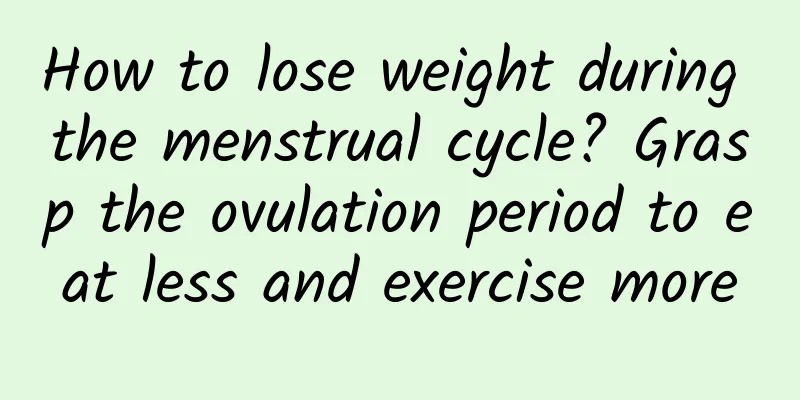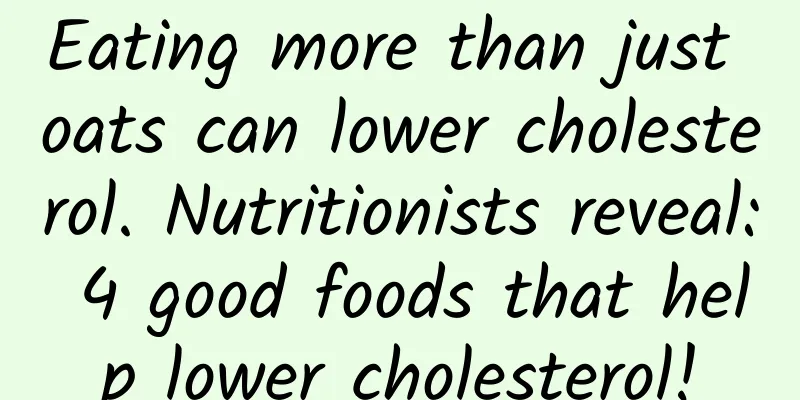How to lose weight during the menstrual cycle? Grasp the ovulation period to eat less and exercise more

|
Girls who have tried many fat-shaving methods but have not been able to successfully get rid of the fat, don't give up! Adjusting your diet and exercise according to your menstrual cycle can make weight loss twice as effective! In the 5914 call for doctors thread, a netizen asked: "What is the menstrual cycle weight loss method?" and what should we do? Let a Chinese medicine practitioner answer your questions. From the perspective of traditional Chinese medicine, a woman's menstrual cycle can be divided into four stages: menstruation, ovulation, luteal phase, and secretory phase, depending on the level of hormones in the body. Traditional Chinese medicine practitioner Lai Ruixin said that the menstrual cycle weight loss method is to arrange appropriate diet and exercise plans according to the different hormones, metabolism, and digestive conditions during each menstrual period. ★ "Menstrual period": Weight gain is normal, and weight loss is not advisable The 1st to 5th day of menstruation is called the "menstrual period". Generally speaking, the menstrual period is the stage when the body's metabolism is most active and more nutrition is needed. However, since the secretion of progesterone in the body decreases during menstruation, it is easy to experience depression, low mood, high stress, poor appetite, etc. If you do not get enough sleep and are overly tired during this stage, not only will you be prone to dark circles under your eyes, but edema will also occur. Therefore, it is normal for women who are menstruating to gain 1 to 3 kilograms in weight. However, Chinese medicine practitioner Lai Ruixin reminds that one should not rush to lose weight just because of weight gain. If one loses weight during this period, most of the weight lost is water weight and the fat tissue cannot be truly reduced. It is recommended that the focus of weight loss during this period should be on adjusting the physical condition to lay a good foundation for the next weight loss stage. ★ "Ovulation period": the peak period for weight loss, eat less and exercise more to lose weight faster After the menstrual period ends, the next 6 to 14 days is the "ovulation period". The ovulation period is the peak period for weight loss. Hormone secretion is vigorous, digestive function is good, metabolism is fast, and nutrient absorption and consumption efficiency are accelerated. Therefore, the ovulation period is the best time to engage in aerobic exercise and promote calorie consumption. It is recommended to maintain at least 7 hours of exercise per week. Since the efficiency of absorbing nutrients during ovulation also speeds up, if the calories eaten are not consumed immediately, the excess calories will be converted into fat and stored in the body. Therefore, women in their ovulation period should eat less high-calorie, high-fat foods, and eat more iron-rich and fiber-rich foods such as spinach, kelp, fish, grapes, etc. Adjusting your diet and exercise according to your menstrual cycle can make weight loss twice as effective! ★ "Luteal phase": Entering the weight loss wall period, eat more low GI foods The 14th to 21st day after menstruation is the "luteal phase". During this stage, the estrogen level in the body decreases and the progesterone level increases, and you begin to enter the weight loss wall period. Since progesterone cannot break down fat, once the progesterone level rises, it will not only cause edema, but will also slow down the body's metabolic capacity, making it naturally difficult to lose weight. It is recommended to eat more low-GI foods during this stage, such as taro, yam, whole wheat bread, soybeans, low-fat yogurt, etc. Low-GI foods can reduce the secretion of insulin in the blood and make you less hungry. If you cannot resist the temptation at this time and eat a lot of high GI foods such as cakes, chocolates, toasts, etc., it will easily cause your blood sugar to rise. In order to cope with the sudden rise in blood sugar, the body will stimulate the secretion of insulin to balance blood sugar. The way insulin balances blood sugar is to convert the sugar in food into fat and store it in the body. Chinese medicine practitioner Lai Ruixin pointed out that when insulin converts blood sugar into fat, it causes blood sugar to drop rapidly. At this time, the brain will determine that the blood sugar is too low, causing the body to send out hunger signals, making you unable to resist and start eating and drinking, thus creating a "vicious cycle of obesity." Therefore, women in the luteal phase should be more cautious about eating high GI foods. (Source: Ministry of Health and Welfare; Table created by Lin Zhiyang) ★ "Secretion phase": weight continues to stagnate, eat more light food, drink more water The 21st to 28th day after menstruation, that is, before menstruation, is called the "secretory period". This stage is affected by progesterone. The body is prone to edema, the skin becomes oily, the weight continues to stagnate, and the mood is unstable. It is also easy to fail to lose weight at this stage. The appetite increases and you start to eat and drink to liberate yourself. However, in order to wear smaller pants and have a slim figure, you still have to resist the urge to eat high-calorie foods. It is recommended to eat more light foods, drink plenty of water, and avoid eating too salty foods during this stage to prevent the body's salt and water storage from increasing, causing edema. (Source: Chinese medicine practitioner Lai Ruixin; table created by Huang Huishan) |
<<: Exercise just to burn fat? The key to weight loss is: calorie consumption
>>: Summer is the peak season for obesity! 7 taboos for weight loss
Recommend
What causes chronic pelvic inflammatory disease?
What causes chronic pelvic inflammatory disease? ...
What should I do if I have chronic pelvic inflammatory disease?
According to clinical data, the number of patient...
What are the symptoms of habitual miscarriage? Pay special attention to these 4 symptoms
Nowadays, women are under great pressure in life....
If you want to lose weight by reducing sugar, is it enough to just eat less sugar? Japanese diabetes doctor: Supplementing more protein and iron is effective
Sugar-reducing diets have become quite popular in...
There are many factors that can cause irregular menstruation.
For female friends, there are always a few days i...
There is a secret to losing weight quickly. Combine 4 fat-burning superstars to help you lose weight easily in 2 weeks!
Graduation season is here again, and teacher appr...
What foods should you avoid when you have ovulation bleeding?
Ovulation bleeding is different from menstruation...
What medicine should I take for cervical erosion?
What medicine should I take for cervical erosion?...
What are the dangers and sequelae of Bartholinitis?
Bartholinitis may cause pain, fever, suppuration,...
Most women will get cervicitis after pregnancy? It is better to know these common knowledge about cervicitis as early as possible
After getting married, women will consider having...
How long does it take from admission to discharge for ovarian cyst surgery?
How long does it take from admission to discharge...
Study: Hot yoga three times a week boosts brain power
American actress Jennifer Aniston is a well-known...
What should be paid attention to after uterine fibroid surgery? How should patients with uterine fibroids take care of their diet?
Some women may not be able to get good results wi...
Eat fruit yogurt or milkshake for breakfast, be careful not to gain weight! 6 High-Sugar Breakfast Landmines to Avoid
Busy office workers always eat breakfast in a hur...
What are the symptoms of having endometriosis?
For women of childbearing age, endometriosis is a...









